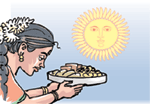| Plus |
|
|||
|
A
time for renewal The New Year, which also marks the birth of spring, is a time when all members of a family get back to their ancestral homes with a sense of nostalgia. "Only a society living close to nature would really enjoy and understand a festival like the New Year, which is bound up with nature and the cycle of life," President of the Hindu Women's Society Ms. Sivanandini Duraiswamy writes in her book 'Remembering Hindu Traditions'. "The New Year festival is associated with a wealth of traditions, rituals and customs which are enchanting and mystical. “These are woven into the fabric of astrology, for it is believed that the New Year dawns with the Sun, Surya Bhagavan, coming down to earth riding his golden chariot drawn by seven horses, each representing a day in the week. The Sun is also referred to as Kaala-thevan, the one who determines the various seasons. And the observances on this day are made in conformity with this movement of the Sun and thanksgiving is offered to the Sun God," Ms. Duraiswamy writes. Preparations begin about two weeks prior to the day when homes are cleaned and sometimes repainted. New clothes are bought for all and womenfolk prepare heaps of sweets and savoury snacks in preparation for the festival. They also adorn the entrances of their houses with Kolam (designs made with rice flour) and deck the doorways with mango leaves. The Tamil people rise early on New Year's morning and have their ritual bath. Each member of the family is anointed with Maruththu Neer before the bath. It is a decoction of a variety of medicinal herbs, leaves, flowers, saffron etc., prepared by temple priests and available only at temples. Herbs and flowers used in the preparation are lotus, pomegranate, vilvam, aruham grass, saffron, thitpili, sukku and pepper. The ritual bath signifies the outer purity making way to spiritual purity. After wearing the new clothes in colours given in the Panchaangam, family members gather in the shrine room for a special pooja. The ceremony begins with the lighting of the kuthu villakku (traditional lamp) which is placed next to the Niraikudum (a brass bowl-like container with a short neck filled to the brim with water and decorated with mango leaves arranged in a circle around a husked coconut placed on top of the neck of the brass container. Freshly boiled sweetened milk rice is offered to God, thanking him for the first crop and praying for a bountiful harvest. It is the Sun God (Surya) that is worshipped on this auspicious occasion, although Ganesha, the guardian deity of each household is also offered fruits, sweets and flowers to invoke his protection for the members of each family. After prayer, the head of the family makes gifts of money, wrapped in betel leaves to all the members of the family (the first transaction). This blessing of prosperity and well being from elders is called Kaivishesham. The exchange of a sheaf of betel leaf is a vital factor in binding family relationships. It is considered to be a lucky transaction and with it one looks forward to a year of plenty and prosperity. The exchange also emphasises the principle of social obligation as gifts are presented to all dependents of the household. In turn children and other family members touch the feet of their elders in reverence. The family then goes to the temple with offerings of flowers, fruits, garlands, incense and silk. On their return from the temple, the family partakes of a feast comprising sweet pongal, ginger sambal, vada fruit and other sweet meats. The Mango Pachadi (made from raw mangoes, jaggery and neem flowers) that is sweet, sour and bitter is essential in some families for it signifies all the different aspects of our life. Most people also visit the homes of their elders with trays laden with sweets and pass on good wishes for a prosperous and healthy new year. In villages various dances and games form part of the festivities. In the belief that any ill effects of planetary combinations will be warded off, most people observe all the traditional rituals with due faith. These serve to cleanse the mind and the hearts of people, strengthen their family unit, create a feeling of sharing and caring and facilitate progress towards the goal of spiritual perfection. Puthaandu Vaalthukal (New Year Greetings). |
||||
Copyright © 2001 Wijeya Newspapers
Ltd. All rights reserved. |
 Peace
and prosperity - That's what people hope for each New Year. Pudhu
Varudam marks the beginning of the Hindu Solar Calendar (Almanac)
on the first of the Tamil month of Chittirai when the sun moves
from the last house of the Zodiac (Pisces), to the first house (Aries).
Peace
and prosperity - That's what people hope for each New Year. Pudhu
Varudam marks the beginning of the Hindu Solar Calendar (Almanac)
on the first of the Tamil month of Chittirai when the sun moves
from the last house of the Zodiac (Pisces), to the first house (Aries).